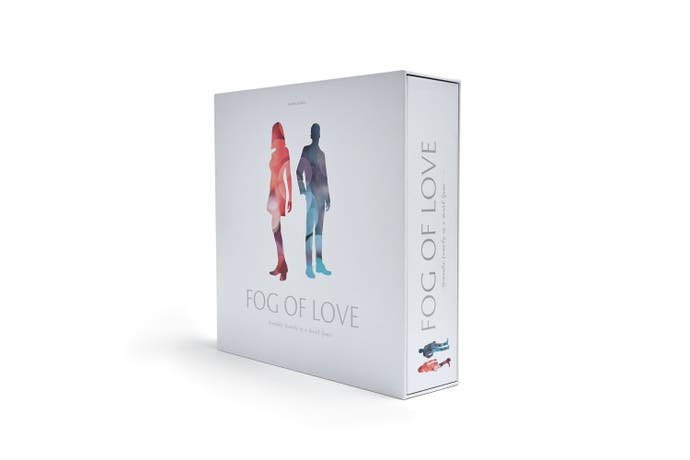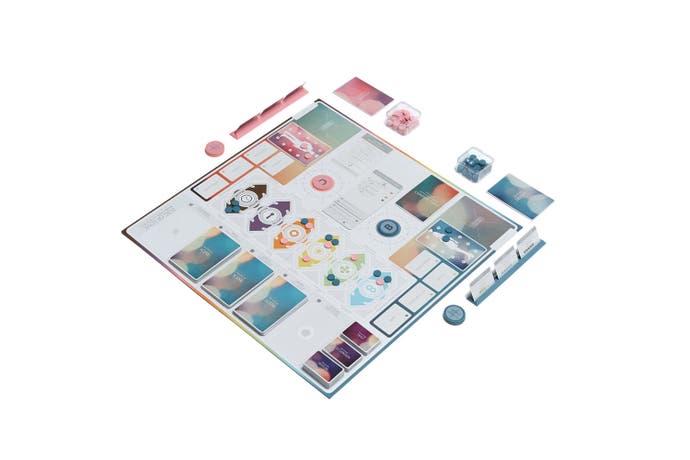Dicebreaker Recommends: Fog of Love, a board game about roleplaying relationships that's all heart
Valentine's cards.
Dicebreaker Recommends is a series of monthly board game, RPG and other tabletop recommendations from our friends at our sibling site, Dicebreaker. Don't forget to also check-out their list of the best couple's board games.
If you're of a certain age, you might remember filling out online compatibility tests as a lovestruck teen. You know, the sorts of viral "tag three friends" Myspace posts and Buzzfeed quizzes that would tell you whether you and your beloved were made to be based on your favourite film, which side of the bed you sleep and whether you put cream then jam or vice-versa. (The only correct answer is jam then cream, of course, but that's an argument for another time.)
Fog of Love is a board game that wraps the central "Are we meant to be?" question of those compatibility tests' in an affecting experience that's part roleplaying game, part Werewolf-esque hidden role game and part min-maxing resource-management puzzle. But while individual parts can be compared to other games, Fog of Love is an experience quite unlike anything else on the tabletop.
The debut release from designer Jacob Jaskov, Fog of Love describes itself as a "romantic comedy" - a cinematic parallel that's most apparent in its explicit use of chapters and scenes to play out the highs and lows of the players' fictional partners over the course of their relationship.

In a short RPG-lite character creation phase at the beginning of each session, each player creates their avatar from a pick of both broad and specific physical features, careers and personality traits represented by cards. (Aspects such as your name, gender and race are left entirely in your control, with revisions of the base game improving its existing depiction of LGBTQ+ relationships.) With minimal effort, the handful of cards efficiently create characters that feel wonderfully human, with enough room to span from relatable to amusing. You could be an airline pilot with a facial scar and a seducing scent, a clumsy wedding planner with a habit of giggling or even a royal heir with a piercing who otherwise dresses in old-fashioned clothes.
These details also help sketch out the characters' individual and shared psyches in a more concrete way, broken into various broad descriptors - sensitivity, extroversion, curiosity, sincerity and so on - by a series of up and down arrows in the centre of the game board. Gain a point in a trait and you'll add a wooden disc of your player colour to the up arrow - lose a point and you'll do the opposite. Over time, the makeup of the characters' relationship will be laid bare on the board. Perhaps you're a couple that thrives on mutual gentleness, a strict adherence to discipline or a desire to explore something unfamiliar - or even the opposite.

This compatibility is charted via the game's central focus: chapters broken into individual scenes that present the couple with various dilemmas. Like the characters themselves, these events - divided into serious, sweet and dramatic prompts - are often familiar and mundane: the first trip to Ikea together, a spat while dining out at a restaurant, a question about how one of the couple looks in new clothes or even how you choose to pose for a photograph together. Each player secretly decides from each multiple-choice outcome how their character would act based on their personality, before simultaneously revealing their answer. Matching your partner can benefit the relationship's overall strength, while different choices can affect the balance of individual traits.
While pursuing the ideal coupling might seem the obvious objective, Fog of Love's relationships can be as complex as the real thing. Each player may want their fictional relationship to work out in the end, but characters also have their own secret goals to achieve that can lead to a far less fairytale ending. These hidden goals - such as being "disorganised" or "kind", benefiting those who sway the central traits in a particular direction - neatly represent the idea of making a relationship work despite each other's flaws and individual desires. Or, in some cases, it can result in the acceptance that maybe you're just not that compatible after all.

For this reason, while Fog of Love appears on its surface to be an ideal game for real-life couples, it's arguably best played with someone with whom you're comfortable exploring a fictional relationship without any potential real-life repercussions. The predicaments presented are believable enough to inspire similar disagreement about one choice or another if the line between you and your fictional character is sufficiently blurred. Like a good roleplaying game, being able to immerse yourself fully in your character will give you the best outcome from playing, though there's a good chance that won't mean the best outcome for their relationship.
Although Fog of Love technically has a "victory" condition for each player - whether alone, or together - it largely feels like an obligation of the medium. The game is most affecting in the way that it makes the journey together, rather than the destination, the reason worth playing. That's as true for its characters as it is for the players controlling them. Whatever the outcome might be, you won't regret the time spent together.

